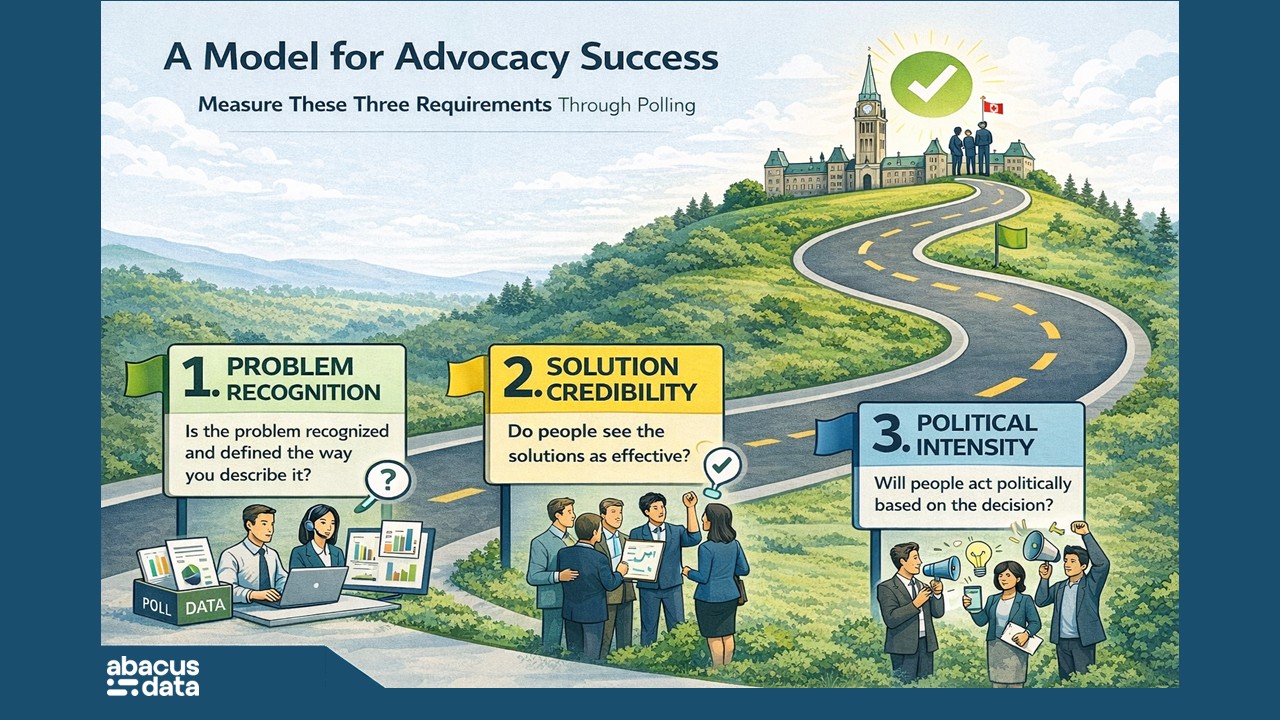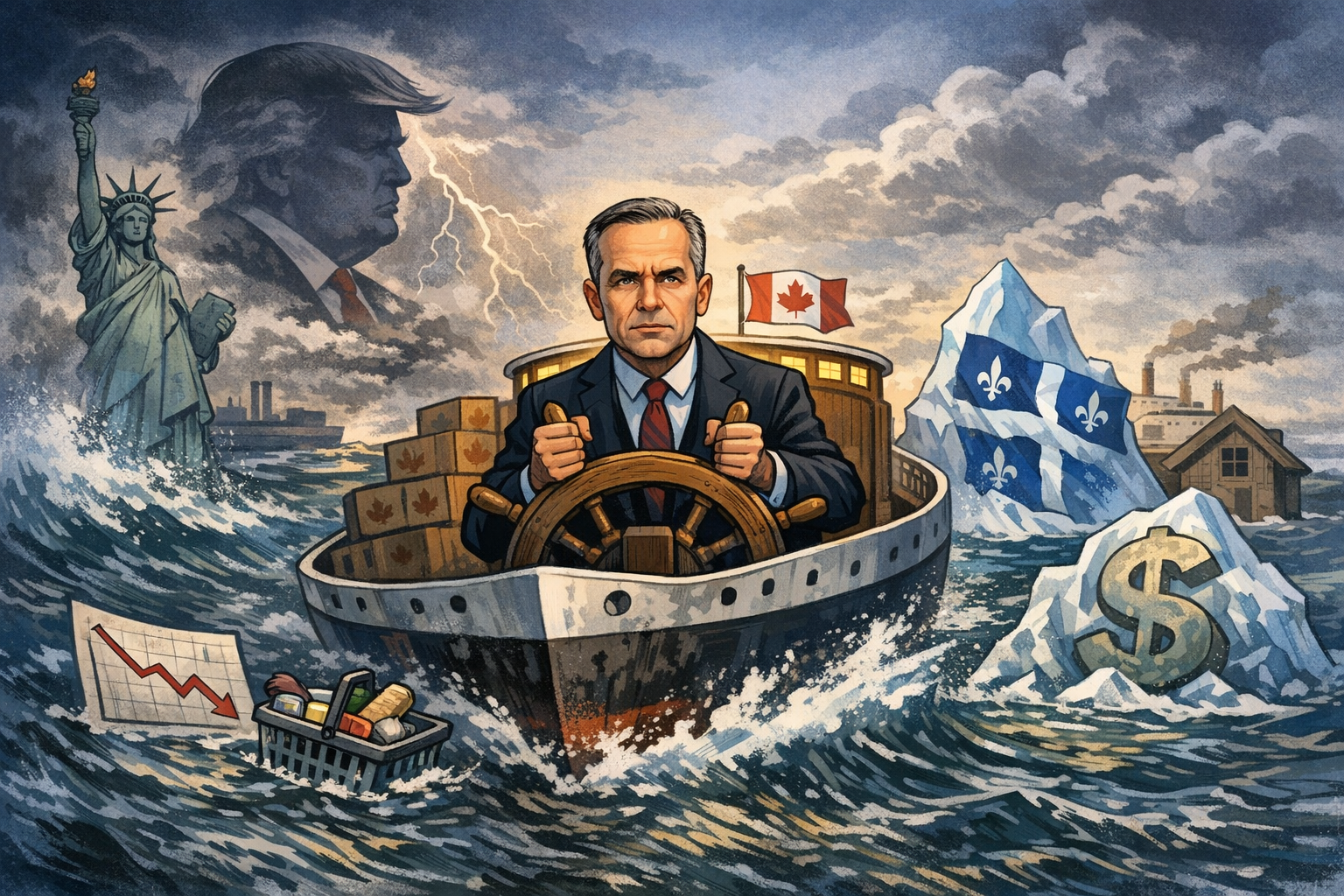Election Poll: NDP and BQ rise as Liberals and Conservatives remain deadlocked
October 13, 2019
This week, we completed a large national survey of 3,000 Canadians. All interviews were done after the English language debate and before the French-language debate Thursday evening. Here’s what we found:
LIBERALS AND CONSERVATIVES AT 32%; NDP AND BQ GAIN GROUND.
If an election were held at the time of the survey, the Liberals (32%) and Conservatives (32%) are tied nationally followed by the NDP at 18%, the Greens at 9%, and the BQ at 6% (25% in Quebec). Maxime Bernier’s People’s Party registers just 2% support nationally. Most changes are within the margin of error, so we encourage caution in interpreting changes. Having said that, there is clear evidence of improvement for the NDP and the BQ.

In BC, we see a three-way tie with the Liberals and Conservatives at 29% and the NDP at 26%. In Ontario, the Liberals have opened up a 5-point lead over the Conservatives (37% to 32%) with the NDP at 19%. In Quebec, a 21-point lead for the Liberals last week has been reduced to 12-points as the BQ is up 6 to 25%. The Liberals lead by 10 in Atlantic Canada.


NDP support is strongest among those aged 18 to 29 at 26% and drops to 12% among those aged 60 and over. Liberal support is consistent across age groups, while the Conservatives are stronger among older voters and weaker among younger ones.
LEADER POPULARITY: SINGH SURGES AS SCHEER SLUMPS AGAIN
The biggest shift in our tracking comes in feelings towards NDP leader Jagmeet Singh. Since Oct 5, positive impressions of Mr. Singh are up 9-points to 41%, the highest we have ever tracked for the NDP leader. His negatives are also down 3-points to 22%.

The rise in Mr. Singh’s image is broad-based, with a few exceptions. While his positives have increased 9 points or more in BC (+9), Ontario (+9), the Prairies (+14), and Atlantic Canada (+17), in Quebec his improvement is marginal, from 31% last week to 33% this week.
The surge in positive views of Mr. Singh also crosses age groups. He’s seen an 8-point increase among those aged 18 to 29 (from 44 to 51%), those aged 30 to 44 (from 34% to 42%), and a 12-point increase among those aged 60 and over (from 23% to 35%).
Mr. Singh’s image has improved across the political spectrum, as well. He was already well regarded among those on the left (61% positive last week, 62% this week), but he improved 14 points among centre-left voters, 9 points among centre voters, and even 9 points among voters on the right.

Turning to the other leaders, Andrew Scheer has 30% positive and 47% negative opinion nationally this week. Negative feelings towards the Conservative leader have risen 9-points since the start of the campaign. Mr. Trudeau has 33% positive and 49% negative opinion across the country. Elizabeth May has 26% positive and 22% negative opinion.
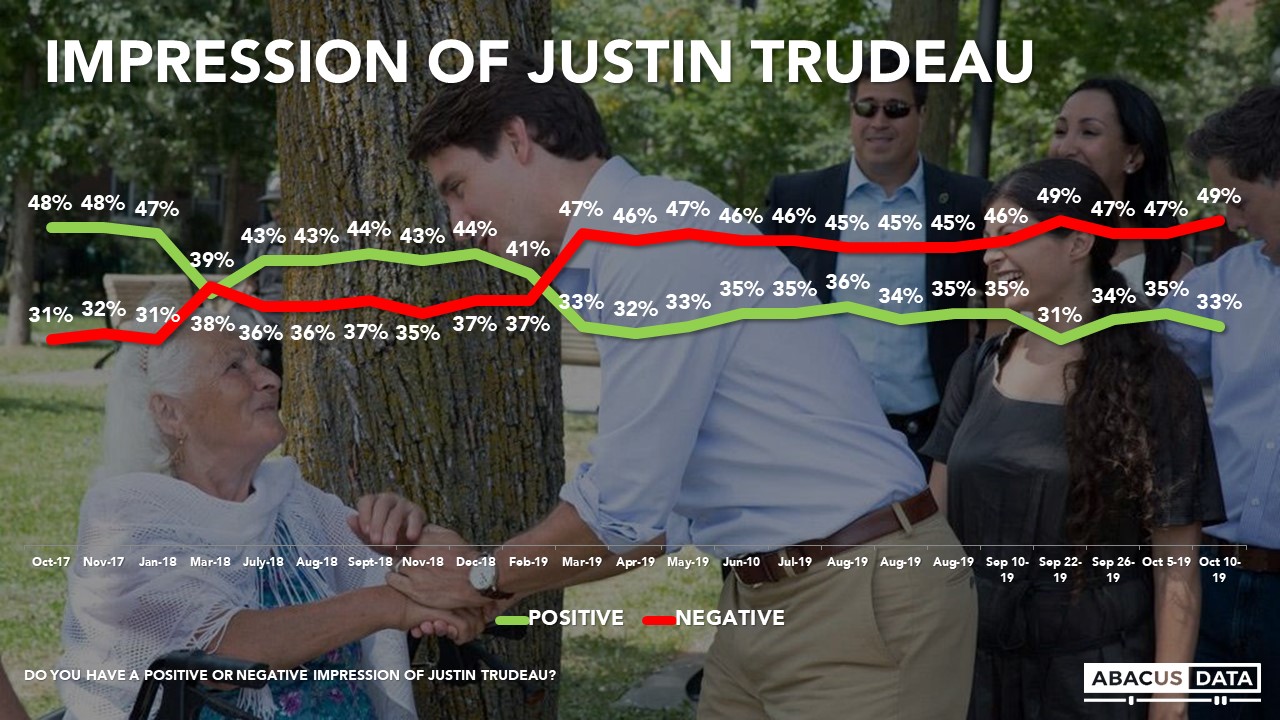


PREFERRED PRIME MINISTER: TRUDEAU LEADS SCHEER BY 4; SINGH UP 7-POINTS SINCE THE START OF THE CAMPAIGN
When asked who they would prefer to be prime minister after the election, 34% picked Mr. Trudeau (down 1 since the start of the campaign), 30% prefer Mr. Scheer (down 3), while 20% prefer Mr. Singh (up 7). 11% would prefer Ms. May as Prime Minister and 4% Mr. Bernier.

In Ontario, 37% prefer Mr. Trudeau to 30% for Mr. Scheer and 20% for Mr. Singh. In Quebec, Mr. Trudeau has a 21-point lead over Mr. Scheer with Ms. May and Mr. Singh tied for third at 14%. In BC, it’s a three-way tie with Mr. Trudeau at 29%, Mr. Scheer and Mr. Singh at 27%, respectively.
ALMOST ALL THINK THE ELECTION IS CLOSE; MORE THINK LIBERALS WILL FORM GOVERNMENT
86% think the election will be close while 14% think one party will win by a lot. This view is consistent across the country and demographic groups. It’s also consistent across party supporters. 84% of Conservative supporters, 87% of Liberal, 88% of NDP, 90% of BQ, and 86% of Green Party supporters believe the election will be close.


When asked which party they think will form the government after the election, 41% think the Liberals will win followed by the Conservatives at 32%. Only 5% think the NDP will win the election while 2% picked the Greens. 19% say they are not sure.
Most Liberal supporters think the Liberals will form the government; most Conservatives think the Conservatives will. Only 24% of NDP voters think the NDP will win. The plurality of NDP, Green and BQ voters expect a Liberal victory.
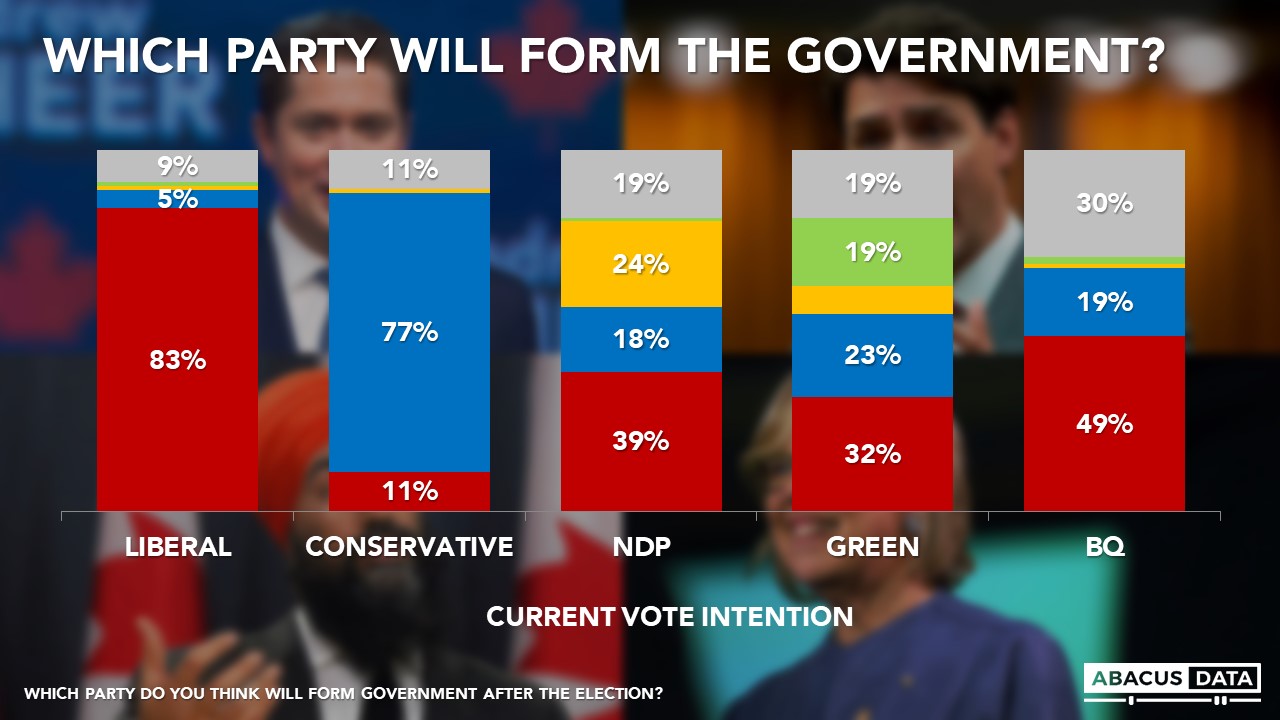
IN A HEAD-TO-HEAD, MORE PREFER A LIBERAL GOVERNMENT OVER CONSERVATIVE ONE, ESPECIALLY AMONG NDP, GREEN AND BQ SUPPORTERS WHO THINK THE LIBERALS WILL WIN THE ELECTION.
To assess what might happen if voters consolidate around a choice between the two parties at the top of the polls, we asked respondents if they would prefer to see Mr. Trudeau or Mr. Scheer become PM after the election. Overall, 54% would prefer Mr. Trudeau and 46% prefer Mr. Scheer (this is unchanged from last week).
Among NDP, Green, and BQ supporters, 66% would prefer Justin Trudeau return as prime minister over Mr. Scheer. Half of them (52% and 10% of the electorate) already think the Liberals will win, which means it will be harder for the Liberals to persuade them to vote strategically to block a Conservative win unless they become convinced in the next week that a Conservative victory is more likely.
Another 30% of these NDP/Green/BQ voters who want Trudeau over Scheer feel the Conservatives might win or the outcome isn’t clear (5% of the electorate). These may decide to vote that feeling more readily since they are not convinced right now that the Liberals will pull out a victory.
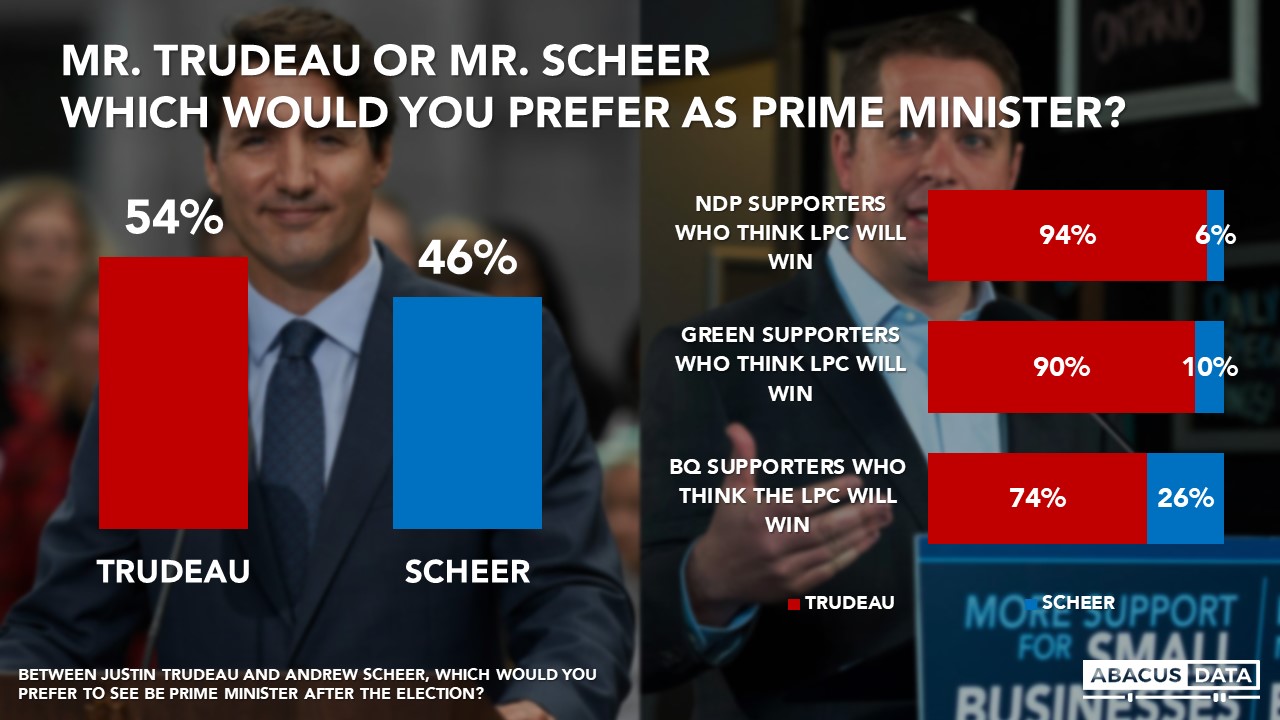
The Conservative path to growth is less obvious considering that its pool of accessible voters is smaller and fewer of those voting NDP, Green or BQ would prefer a Scheer-led government. Add that Mr. Scheer’s personal image has become increasingly negative over the campaign and it’s unlikely that the Conservatives can expand their support with the electorate. Their strategy now may rely more on turnout differential and hoping that those voting for their opponents are less motivated to vote than their supporters.
UPSHOT
According to Bruce Anderson: “The campaign has failed to find a defining idea or moment so far, and there’s a good chance that a lot of voters will make up their minds very late in this campaign, even as late as on the way to their local polling place. Feelings about Mr. Trudeau have been pretty stable since February of this year, and support for the Liberal Party has been in a range that could produce another victory for much of the last couple of months. At the same time, progressive voters are tempted by a progressive campaign that feels less tethered, and centre-right voters want some more conservative influences in Ottawa but are not looking for harsh austerity or social conservatism.
If Mr. Trudeau has yet to convince people to give him a second term, Mr. Scheer has had the most unsuccessful campaign so far – his agenda has not really captured the imagination of voters, and his personal image has disappointed more than it has attracted voters.
As I see it, the enthusiasm for a Scheer government is weak – the base of the Conservative Party is motivated more by a dislike of Justin Trudeau, and progressive values. At this point, especially with a platform release that will expose them to criticisms about austerity, the Conservative leader seems to be focusing on motivating and driving turnout among those who have been aligned with his party for most of this year, rather than reaching new voters.
For Mr. Trudeau, the road forward is clear. He may not be able to improve upon his personal numbers at this point, but there are many voters not yet in the Liberal column who would prefer a Liberal government to a Conservative one. As of now, they are leaning Green, NDP, and Bloc Quebecois. Much of that is about a preference for a progressive agenda, including climate action.”
According to David Coletto: “For almost four weeks of the campaign, vote intentions and attitudes moved very little overall. But in the past week, we have seen some substantial shifts in attitudes and intentions.
Mr. Singh has benefited from a strong showing in the English-language debate while the BQ has made gains in Quebec following a strong performance by Mr. Blanchet in the TVA French-language debate. The NDP and BQ gains have come at the expense of both the Liberals and Conservatives at this point, making their paths to a majority government more difficult and the outcome of the election muddier.
A plurality of Canadians thinks the Liberals are likely to form the government after the election. In a way, this could have given some voters who like Mr. Singh or Mr. Blanchet or their progressive agendas more comfort in being able to vote for their first preference without risking electing a Conservative government. If these perceptions shift between now and October 21, these NDP and BQ gains may reverse as almost all NDP, BQ, or Green Party supporters who think the Liberals are on their way to winning the election would prefer Mr. Trudeau to Mr. Scheer as Prime Minister.”
BTW: We are looking for a consultant or senior consultant to join our team. Find out more here.
METHODOLOGY
Our survey was conducted online with 3,000 Canadians aged 18 and over from October 8 to 10, 2019. A random sample of panellists was invited to complete the survey from a set of partner panels based on the Lucid exchange platform. These partners are double opt-in survey panels, blended to manage out potential skews in the data from a single source.
The margin of error for a comparable probability-based random sample of the same size is +/- 1.9%, 19 times out of 20. The data were weighted according to census data to ensure that the sample matched Canada’s population according to age, gender, educational attainment, and region. Totals may not add up to 100 due to rounding.
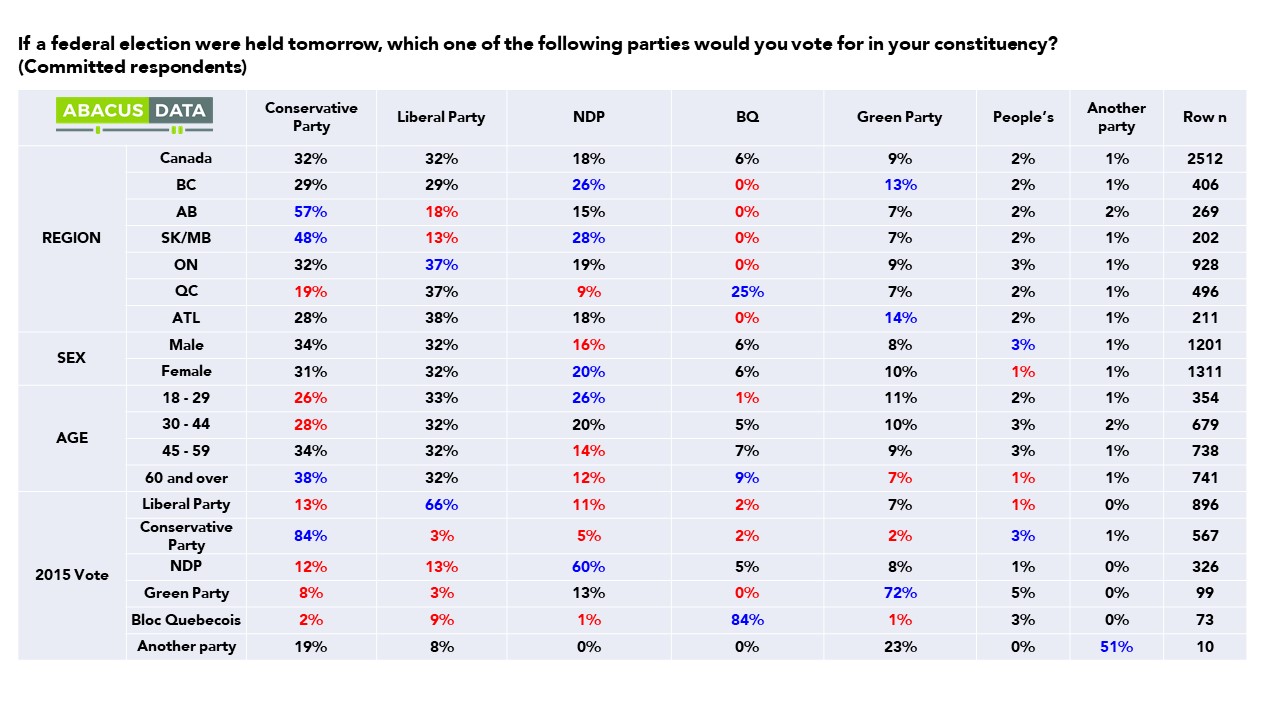
ABOUT ABACUS DATA
We are the only research and strategy firm that helps organizations respond to the disruptive risks and opportunities in a world where demographics and technology are changing more quickly than ever.
We are an innovative, fast-growing public opinion and marketing research consultancy. We use the latest technology, sound science, and deep experience to generate top-flight research-based advice to our clients. We offer global research capacity with a strong focus on customer service, attention to detail and exceptional value.
Contact us with any questions.
Find out more about how we can help your organization by downloading our corporate profile and service offering.


